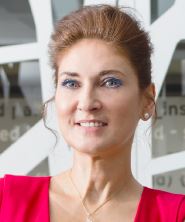Wendy Montgomery
Head of HR Asia Pacific, Red Hat,
"It's not enough to just be a specialist in HR. HR associates must know how each of the different departments supports the business whether it's finance, product or marketing."
Wendy Montgomery has been told that she is not your typical HRD. When asked whether she would choose to become an HRD again if she had the option, she is
She obtained her postgraduate diploma in HR at a time when there were no specific HR qualifications on offer. If anyone wanted to work in HR during that period, they would generally obtain a qualification in business administration.
“I admire how HR has evolved into the function it is today. It’s seen as a real profession with
Knowing this will enable you to be a competent and strategic HR business partner that the profession calls for us to be.”
Career path
Wendy started her HR career in the British Army, being stationed with the Gibraltar Regiment.
After working delivering National Vocational Qualifications (NVQ) in Germany as a Trainer, she moved to the UK to work for Hays IT (SAP division), where she recruited SAP consultants for the Big 6 in the IT space. In 1999, she moved to Singapore to become
Since working for Siebel, she has worked in Singapore for International SOS, ESPN STAR Sports and Vistaprint before joining her current employer Red Hat, where she is Head of HR, Asia Pacific.
Having worked in four different countries and on two different continents, she believes this international experience is invaluable. “Working in Europe has given me valuable experience in learning about different labour laws and employment legislation. I would recommend anyone to live in a different region as it provides diversity of thought and gives you exposure to different cultures.”
In her current position, she has to communicate with offices all around the world, which poses a challenge to her work-life balance. “At the start of the day in Singapore, the US will still be
Be hungry to learn
Wendy has worked across several industries such as media, medical services and software. She believes there are both advantages and disadvantages to remaining in
Furthermore, she feels that it is absolutely necessary to understand the inner workings of running a business. “You will have no idea how to advise the business if you don’t understand its challenges, market or financial model.”
When asked how she built up the necessary skills to succeed as an HRD, she says that she has benefited from her roles in fast-paced and dynamic organisations that were ready to transform. “In particular, I have enjoyed several transformational roles when the business was ready to move from a tactical and operational focus to a more strategic and business partnering function. I was able to drive change, implement new systems, redesign HR functions and educate the business on how HR can be a partner, rather than being directed.”
Working in a more dynamic and fast-paced environment provides opportunities to learn more and faster and Wendy would advise aspiring HRDs to avoid falling into a trap of ‘coasting’ along at a slower pace, which curbs one’s potential for development and growth within an organisation.
Furthermore, she says that she has always been hungry to learn and has always had a passion to make positive contributions to the organisations she has worked for. If she is not able to contribute or view results, she would not be satisfied – no matter how much she is paid.
Manage interests of all stakeholders
Wendy succeeded as an HRD by having determination and an ability to influence. She has been challenged frequently by her CEO and, without having confidence in what she was trying to communicate, she would have doubted whether or not she made the right decisions – which is always what she aims for.
“I have always been mindful of setting expectations and ensuring that I am able to deliver what I said I would. Not delivering successful outcomes would, in my opinion, result in lost credibility and damage to my personal brand."
She stresses it is also important to take an approach that balances the interests of both individuals and organisations. “It’s important to maintain a neutral viewpoint and establish what is fair and respectful to both sides.”
Final words of advice
The best advice given to Wendy was not to jump too fast when it came to making decisions. “It’s better to think it through and not force a solution.” This is a piece of advice she still follows.
Wendy would encourage anyone to keep up-to-date with
She continues, “Keep up-to-date with technology and what new trends or products are being launched. It also pays to get a mentor so you can learn from their knowledge and insights and what has made them successful. You should also get yourself out there
“I would advise you to think of yourself as a business person who is an HR professional. You should be able to create a vision and get your colleagues to buy into that vision. If at times you can’t make your own decisions, do not be afraid to seek input and feedback from others to help make better informed decisions or drive better outcomes.”

